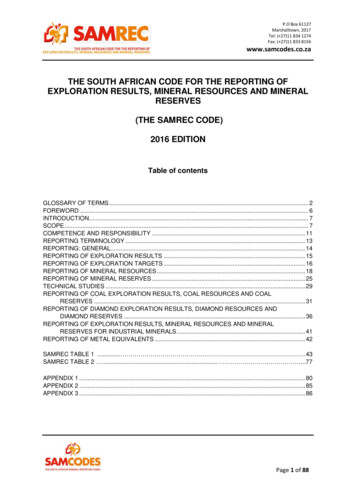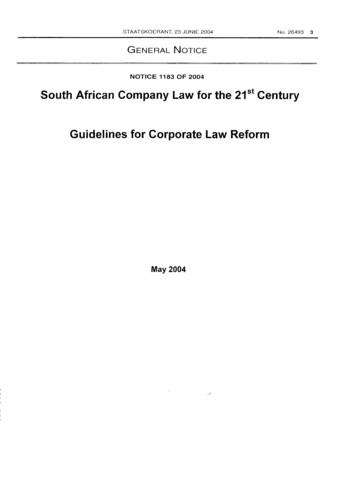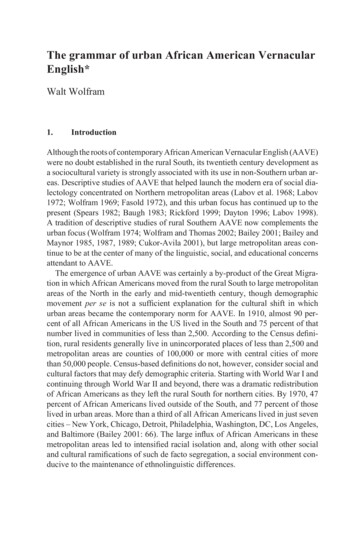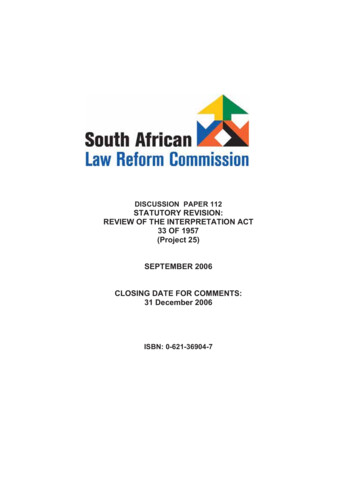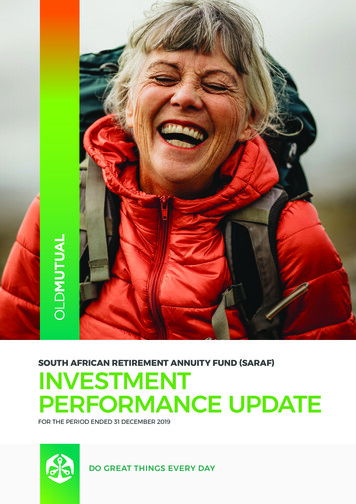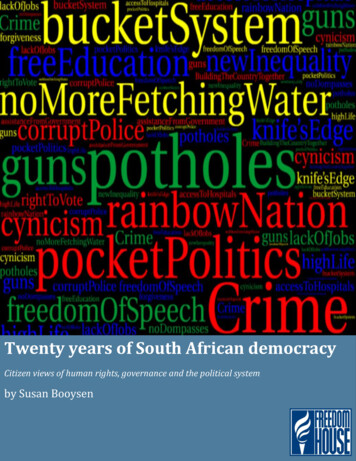
Transcription
Twenty years of South African democracyCitizen views of human rights, governance and the political systemby Susan Booyseni
ContentsList of tables . vList of diagrams . vAcronyms . viAbbreviations and colloquial and commercial terms used in the narratives . viiDistribution of focus groups by province .viiiExecutive Summary . 1Section 1: Introduction: objectives, methodology, analysis and political context . 41.1 Introduction and objectives of the study . 41.2 Methodology and implementation of the study . 41.3 Use of quotations in this report . 61.4 Report structure . 9Section 2: Human rights, change and daily life in communities across South Africa . 112.1 Introduction and synopsis of main findings . 112.2 It is a different, much-transformed South Africa . 12The Constitution and implementation problems . 12Uneven realization and expectations of more. 132.3 Change is imperfect, but black people are in power and there is hope . 14Racial dignity and human pride . 14Small-town racism and inequality before the law . 15Minority group experiences of racism . 16New race-class inequalities . 16Women’s rights and gender roles – affirmations of change . 17Children’s rights – celebration and shortfalls . 18Low-key xenophobia . 182.4 Hope and socio-economic transformation – living the life of realized rights, with gaps . 19Education is better, with provisos . 20Opportunities for business and enterprise . 21Food parcels and feeding schemes for children . 21Health care is better, with exceptions . 22ii
Housing is much improved, but hovels remain . 22Access to water, electricity and sewerage services . 23Land . 242.5 Economic freedom with unemployment . 25The problem of politicians and hollow job promises . 26Unemployment and cronyism. 27Crime, and links to unemployment. 27Drugs, alcohol, gangs and crime . 28Section 3: Political system, leaders and the institutions of South African democracy . 303.1 Introduction and synopsis of findings . 303.2 Longing for the days of ‘Mandela democracy’. 313.3 The trusted parent, with mixed feelings . 32The parent and the government of the rich . 333.4 Experiences and impressions of national, provincial and local government. 343.5 Public service across the levels of government . 363.6 Political executive, Public Protector and Constitutional Court . 37The political executive . 37Constitutional Court . 38Public Protector . 383.7 Police and the court system – crises of confidence . 39Personal safety as a compromised human right. 39Inequality and corruption at the hands of the police and the courts. 40Section 4: Public participation, engagement with the system and the media . 434.1 Introduction and synopsis of main findings . 434.2 Public participation, self-help and community help . 434.3 Bottom-up perspectives on how the system of representation could work . 464.4 Sympathy for protest and strike action . 474.5 The mass media, political awareness and amplification of people’s voices . 49The media creating national citizens . 49The media as extension of people’s voice . 50Section 5: Voting and party political choice . 525.1 Introduction and synopsis of main findings . 525.2 Commitment to vote, albeit not the time of euphoria anymore. 53iii
Voting improves job prospects . 54Citizen duty and earning the right to criticize . 54Defending liberation . 55Hope for more delivery . 555.3 Why many South Africans may not vote come Election 2014 . 55‘Hollow words’ make voters feel it is futile to vote . 565.4 Election campaigns and the cynical South African voter . 575.5 The political parties and Election 2014 . 58The African National Congress (ANC) and complexities of support-with-resentment . 58The main reasons for voting ANC . 58Reasons to vote for the Democratic Alliance (DA) or not to vote DA . 63The appeal of the Economic Freedom Fighters (EFF) . 65The appeal of Agang SA and comparisons with Cope. 67Appendix A: Synopsis of the discussion guide . 68iv
List of tables1: Profiles of focus groups conducted between August and September 20137-82: South Africa in one word: Human rights realization and the deficits133: South Africa’s representative institutions in one word or phrase364: Crisis of confidence in the South African Police Service405: Bottom-up suggestions to get voice and representation6: The media and perceptions of the good and the bad7: Reasons to vote or continue to vote ANC in 201446-475060-62List of diagrams1: Democracy, human rights and rule of law in South Africav10
AcronymsABETadult basic education and trainingANCAfrican National CongressARVanti-retroviralBEEblack economic empowermentCopeCongress of the PeopleCosatuCongress of South African Trade UnionsDADemocratic AllianceEFFEconomic Freedom FightersEPWPExpanded Public Works ProgrammeHIVhuman immunodeficiency virusKFCKentucky Fried Chicken (fast food chain)KZNKwaZulu-Natal provinceLSMliving standards measureMMmixed-minority: the Cape Town mixed-minority (colored and white background) focusgroupMPsmembers of parliamentMPLsmembers of provincial legislaturesNGOsnon-governmental organizationsSASSASouth African Social Security Agencyvi
Abbreviations and colloquial and commercial terms used in thenarrativesBlossomA butter spread / margarineBucket SystemA bucket used as a toilet in communities without a water-borne sewage systemBurial SocietySimilar to Stokvel (see below) with money saved by a group to cover funeralexpensesDompasColloquial name for the pass that black-Africans had to carry in apartheid days;it was an instrument to monitor and help enforce restrictions on movement andresidenceMarikanaThe North West province shooting/killing of 34 striking miners by South AfricanPolice Service in August 2012; a judicial commission of enquiry is continuing itsinvestigationPanadoOver-the-counter mild painkillerRamaA butter spread / margarinePick-n-PayA supermarket chainRDP HouseReconstruction and Development Program (RDP) Houses are low cost housesbuilt with government subsidies.ShopriteA supermarket chainStokvelAn invitation-only savings scheme or credit union with a rotating monthlypayoutTataFormer president Nelson MandelaTenderpreneurWell-connected business person getting government contracts and getting richUbuntuAn African philosophy that stresses selflessness, empathy and theinterdependency of humanityvii
Distribution of focus groups by provinceNorth West (2): Sannieshof ZeerustLimpopo (2): Modimolle VikingFree State (3): Bloemfontein Heidedal TheunissenMpumalanga (2): Barberton EmalahleniGauteng (7): Executive Diepsloot Hammanskraal Johannesburg Pretoria Thokoza PilotNorthern Cape (1): GariesKwaZulu-Natal (4): Durban Jozini Pietermaritzburg Richards BayWestern Cape (3): Cape Town-MM Dysselsdorp KhayelitshaviiiEastern Cape (3): Dispatch Makana Whittlesea
Twenty Years of South African DemocracyExecutive SummaryAfter 20 years of democracy, South Africans celebrate that human rights have been realized and thatsociety is transforming. While there is strong disappointment with the government and its leaders,South Africans retain their faith in the democratic system and do not transfer their discontent to theAfrican National Congress (ANC). These are among the key findings of Freedom House’s study ofSouth African democracy, conducted through 27 moderated focus groups convened between Juneand October 2013 that included South Africans from all racial and income groups and from rural aswell as urban areas.Other findings include: South Africans take their human rights for granted and retain faith in the democratic system,with strong support for voting.The ANC maintains strong voter support, despite considerable public cynicism aboutgovernment and politicians.Citizens expect the government to build on the substantial amount it delivered during thefirst two decades of democracy, even if they distrust many state institutions.Citizens see legislative institutions as weak, unresponsive and corrupt.There is an extreme lack of confidence in the police, fuelled by rampant crime and the beliefthat lawlessness prevails.Although there are exceptions, most South Africans consign the experience of pervasiveracism to history, and young people have moved beyond thinking along racial lines.The study generated an authoritative dataset that makes possible new understandings ofcontemporary South African democracy. This executive summary outlines and interprets the mainfindings of the accompanying detailed research report.South Africans maintain the ANC in power despite frequent criticisms of lack of accountability andself-serving behaviors amongst ANC leaders in government. To justify this support, citizens displaceblame for the barrage of wrong-doings that they themselves cite. Thus, even as they find reasons tosupport the ANC, they condemn the government, or they exonerate government leaders whilecondemning those who are entrusted with implementation. Significantly, they believe that nationalgovernment is more trustworthy than the local.A deep sense of identification with the ANC prevails; it is part of citizens’ culture to support the ANC.A young man from Emalahleni equates ANC support with a ‘car that was smashed up in an accident’which one repairs, not replaces. South Africans know their leaders have been enriching themselves;however, they believe that, should a new party come to power, the new leaders may also startamassing wealth, thus pushing citizens even further down the queue for gains from the democraticsystem.The ANC has forged a post-apartheid identity which helps build citizen loyalty. Society is raciallytransformed – despite smaller contemporary reminders of racial indignities – and the ANC is seen as1
the movement that delivered the country from apartheid. It has created a monopoly overassociations with liberation.The voices in these focus groups talk about the main opposition party, the largely minoritysupported Democratic Alliance (DA), as too reminiscent of the racial past. It is fine as an oppositionparty, they indicate, but they are uncertain whether the past may reoccur should they give this partytheir vote. They give credit to the DA for some racial transformation within the party, but they stillbelieve, in the words of a woman from the rural village of Viking, that the party leader ‘is going tocome with some stunts’. They also recognize the DA’s help in forcing the government to be moreaccountable, but they do not reward this by switching their vote.As for the Economic Freedom Fighters (EFF), a young man from Richards Bay says they speak the‘language of truth to power’. Many of the groups echo this sentiment. An older man fromKhayelitsha argues that EFF leaders’ past as part of the ANC means they represent ‘loyal opposition’.Substantial societal transformation and policy implementation in the first two decades of democracyhave helped the ANC build its continuous support. Political freedoms have become ingrained inSouth Africans’ civic personalities. Few – particularly black-Africans – fail to see positive changes inhousing, education, health, basic services and social grants. All of these services are recognized asflawed, if not seriously deficient. Nevertheless, citizens display immense patience; like an older manin Theunissen, they use the phrase ‘Rome was not built in one day’.Many look at the government as a caring parent, accepting that this parent-government retains itsbenevolent status in the eyes of the people. In a notable paradox, however, citizens have alsostarted to wonder how much this government really cares. They see the current leadership class asthe new ‘haves’ of the post-apartheid system. In this view, the leaders care for their own pocketsand those of their associates. The absence of political leaders from the communities they supposedlyrepresent exacerbates the belief that they care more for themselves than for the people. ‘This is thenew inequality that is killing our democracy’, said a man from Hammanskraal. Participants alsoexpressed that the politically connected and unconnected are not equal before the law.The search for employment informs this new cleavage. Amidst very high levels of unemployment,citizens observe jobs being taken by those who are connected to the political elite. Despite thecynicism, however, they still see prospects for leaders reconsidering their current ways. In the wordsof a man from Khayelitsha, ‘in my heart I hope that one day government will sober up and see thedifference between those who are rich and those who are poor’.The realities of being continually disadvantaged are reinforced through deficiencies in the quality oflife on the ground. Citizens are exposed to crime and to police whom they see as complicit with andsympathetic to criminals, leaving law-abiding citizens feeling vulnerable. They see suspected rapistsand violent robbers roaming their streets, within a day or two of being charged. There is littleprospect of a fair trial because ‘the files get eaten by the dog’, as a woman from the Barberton groupremarked. Communities round up criminals themselves and beat them as a pragmatic alternative tothe police taking an extended time to respond to calls.In the focus groups, citizens across all provincial, racial, class and party political lines stated that thegovernment institutions designed to be accessible and responsive – the local, provincial and national2
legislative institutions – are instead distant and unresponsive. In their place, some citizensrecommend protest: ‘Cause chaos and get representation’ is the advice from Richards Bay.Paradoxically, this form of direct action helps citizens remain loyal to the ANC because there is aperception that it produces results. Direct advocacy in the form of complaints to the governmentgives people another avenue to extract more services, rather than switch to an opposition party.Despite citizens relying on or supporting protest to improve representation, the report findingstestify to the continued love affair with elections. Most citizens’ disappointment with the institutionsof democratic government and disillusionment with political elites do not mean that they disavowelections. Some will vote in order to make change – either to strengthen an opposition party ofchoice, or in the belief that after further affirmation, the ANC will deliver more. Others vote for theANC to protect the 1994 victory. They also support the ANC in tribute to what they see as Mandela’svirtuousdemocracy.3
Section 1: Introduction: objectives, methodology,analysis and political context1.1 Introduction and objectives of the study1.2 Methodology and implementation of the study1.3 Use of quotations in this report1.4 Report structure1.1 Introduction and objectives of the studyThis study provides a grassroots view of where South Africa stands in 2013 in fulfilling the aspirationsembodied in the Constitution and the democratic system that was established almost 20 years ago.It offers revealing bottom-up perspectives on how South Africans feel about the human rights theyenjoy and see others around them enjoying, the political system and how it works for them, howpolitical leaders are faring in representing them, and the forms of public participation that work forthem, or not. This report offers the latest insights into how South Africans relate to the politicalparties that represent them. The voices in this study illuminate the choices that South Africancitizens will encounter when they go to the polls in 2014.Using in-depth qualitative research, the study reaches beyond statistics and explores what lies in thehearts and minds of citizens. In typical focus group style, the report uses the words of the focusgroup participants themselves. The quotations in this report bring their experiences and perceptionsto life. The analysis represents the accumulated voices of these citizen-participants stating andarguing their experiences of democracy.1.2 Methodology and implementation of the studyFocus groups are a valued research tool to gain in-depth understanding of current and unfoldingphenomena, such as democracy and the experiences of human rights in South Africa. The focusgroups in this study comprised 6–9 participants, all carefully recruited in line with pre-setdemographic and geographic criteria.1 Both the relative participant homogeneity and the style ofmoderation were designed to facilitate relaxed and non-threatening discussions. Participants wereencouraged to feel free to share their experiences and insights, and the discussions reflected this.1Face-to-face recruitment was done for all groups with the exception of the Executive group, which was donetelephonically. Recruitment was typically carried out outside community halls, shopping centres andintersections. Within rural areas recruitment also happened at small local shops within the given community.For metro and urban areas participants were recruited from areas surrounding the location of the group (seeTable 1) while for rural groups, respondents were drawn from that specific area. The recruitment for metroand urban areas was confirmed a week in advance while recruiters for rural areas conducted their work 3–4days before the scheduled group.4
They were informed that there were no right or wrong answers and they should share theirexperiences, perceptions and insights. Participation was voluntary and overwhelmingly enthusiastic.Ensuring the demographic and geographic design of focus groups in this study was of the utmostimportance. The 27 groups – a high number by the standards of focus group research – providedexcellent national coverage. The project complied with rigorous recruitment criteria (reflected inTable 1). Strict adherence to the recruitment schedules ensured that there were no ‘groupies’(people who regularly attend focus groups), besides bringing participants of a range of geographicand demographic backgrounds (gender, race, age group, language, living standards measure (LSM)status, unemployment status) into the groups. Both employed and unemployed citizens wererecruited.Responsibilities in the implementation of the study were: Susan Booysen designed the discussion guide, with valuable comment and suggestions fromthe Freedom House Johannesburg office staff and Ipsos.Group profiles were determined jointly by Booysen, Freedom House and Ipsos.Ipsos, Booysen and Freedom House conducted the moderator briefings.Ipsos implemented the fieldwork.The whole team conducted quality checks. These included the observation of groups thathad formal observation facilities and the careful scrutiny of recordings and transcriptions ofthe rest of the discussions. Ipsos did the translations and transcriptions.Booysen was responsible for data analysis and report-writing, with report structuring andediting assistance by Freedom House’s team in Johannesburg and Washington, DC.Experienced and professional moderators conducted the discussions. They were selected to bedemographically as close as possible to the group characteristics and adhered to a detaileddiscussion guide (see Appendix A for a synopsis of the discussion guide). Discussions were audiotaped, with participants’ permission. The recordings were transcribed and translated (whereapplicable). The discussions lasted about two and a half hours, with a break and refreshments. Allparticipants received a modest honorarium, as token of appreciation for the time they gave. Whererequired, Ipsos provided transport to and from the discussion venues.Ipsos put a range of quality control measures in place to monitor all aspects of focus group rollout.Ipsos, along with the author-analyst and Freedom House, continuously monitored projectimplementation.The discussions were conducted in the predominant language of each region, with English oftenmixed in. Black-African groups form the large majority (17 out of 27) of the project’s focus groups.Several groups of younger ages mixed participants from the four conventional racial categories(Johannesburg and Bloemfontein). In Cape Town the one Afrikaans language group was mainlycolored with some white participants. In Pretoria the Afrikaans language group was white-only, inPietermaritzburg the white-only group was of English background, and the Durban group was Indianonly. In more detail: The groups were spread out across the nine provinces. Care was taken to disperse thegroups across regions within provinces and not to settle for easily accessible and clustered5
selections (see map, p. viii). The groups covered metropolitan, city, urban, small-town andrural settings.Demographically, the class breakdown of the groups shows that eight groups (Khayelitsha,Dysselsdorp, Garies, Barberton, Viking, Jozini, Whittlesea and Zeerust) were in the lowLSM1–4 category. Ten groups (Heidedal, Theunissen, Thokoza, Diepsloot, Hammanskraal,Makana, Richards Bay, Johannesburg, Dispatch and Sannieshof) were in the mid-classcategories of LSM5–7. Nine groups were in the upper class of LSM8–10, but four of them(Cape Town mixed-minority [Cape Town-MM], Modimolle, Pietermaritzburg andBloemfontein) actually straddled the middle and upper groups, running on LSM5–9. TheExecutive group focused exclusively on the LSM10 category.In terms of age, the youth groups (ages 18–25) were the seven groups of Diepsloot,Emalahleni, Dysselsdorp, Richards Bay, Pilot, Bloemfontein and Makana.Eleven of the groups were mixed-gender. This was amongst younger people in modern orurban settings where mixed-gender status is unlikely to impact discussions. Seven furthergroups were female only and nine male only. The slight imbalance is due to the additionalFree State group and the decision to make the Executive group male only. In total, just underhalf of participants were women.1.3 Use of quotations in this reportThis report is about the voices of ‘ordinary’ South Africans. The focus group data enabled theresearcher-analyst to ‘step into the minds’ of South Africans and describe trends based on theparticipants’ own words. The report uses direct quotations to illustrate the arguments, reproducingas many as possible without unnecessary duplication. When similar quotations appear it is toindicate the spread of perceptions across geographic and demographic boundaries.The experiences, observations and words of South Africans, across a wide range of geographic areasand demographics, thus stand central to the analysis. The quotations are given as close as possibleto the original words, which often had to be translated to English. The participants’ words are notcensored or filtered. Because the quotes try to capture participants’ words as closely as possible,grammatical errors do appear. When the report only captures a snippet of avalanches of comments,repeated in several groups, the analysis notes this. The reported quotations remain by and large onlya small segment of the totality of quotations on the theme at hand. They are selected, however,because one individual or group’s words depict the broader trends.6
Table 1:Profiles of focus groups conducted between August and September 2013 (Pilot group conducted in June 2013)For continuous details on demographic backgrounds, the quotations in the text should be read in conjunction with this table.ProvinceLocationGenderAgeLSM*RaceCommunity of Recruitment**Focus Group LanguageEASTERN CAPEDispatchMixed26–395–7ColoredDispatch, Uitenhage, Rosedale, De ana, Jazo, k-AfricanUpper Tambo Village, Lower Tambo VillageisiXhosaBloemfonteinMixed18
contemporary South African democracy. This executive summary outlines and interprets the main findings of the accompanying detailed research report. South Africans maintain the ANC in power despite frequent criticisms of lack of accountability and self-serving behaviors amongst ANC leaders in government. To justify this support, citizens displace



